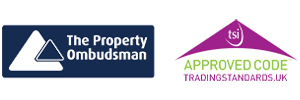Freehold vs Leasehold: What You Need to Know

- Sep 14th 2025
When buying a property in the UK, one of the first things you’ll encounter is whether it is freehold or leasehold. Understanding the difference between the two is essential, as it will affect how you live in your home, the costs involved, and your responsibilities as an owner.
If you own the freehold, you own both the property and the land it sits on. If it’s leasehold, you own the property for a set period of time but not the land or building itself, and you’ll usually need to pay ground rent and service charges to the freeholder.
What does leasehold mean?
With a leasehold property, you purchase the right to live in it for a specific number of years as outlined in the lease. The freeholder (or landlord) still owns the building and the land.
Leasehold is common for flats and apartments, as they sit within larger buildings. However, the number of leasehold houses has increased in recent years, particularly amongst new-build developments sold directly by developers.
Recent changes to the law
The Leasehold and Freehold Act 2024 has now become law, although its measures are being introduced gradually. Eventually, the sale of new leasehold flats will be banned, and Commonhold will replace leasehold as the default system. Under Commonhold, each homeowner owns their own freehold rather than being tied to a landlord.
Key changes already in effect:
• Since January 2025, leaseholders of flats no longer need to wait 2 years before extending their lease.
• Leaseholders in mixed-use buildings have a stronger right to apply for the Right to Manage, helping limit costs and giving more control.
What is the Right to Manage?
Normally, freeholders or management companies are responsible for communal areas and building maintenance. If leaseholders feel their building is poorly managed, they can exercise the Right to Manage, taking over responsibility collectively.
Alternatively, leaseholders can apply to a tribunal to replace the management company.
What is ground rent?
Ground rent is a fee paid by leaseholders to the freeholder, often annually. It may be:
• Fixed: staying the same for the entire lease.
• Escalating: rising periodically, sometimes doubling every 5 years.
Our research shows that nearly half of leaseholders did not realise their ground rent could rise when they first bought their property. To avoid surprises:
• Always ask your solicitor or conveyancer to explain your lease terms.
• Check for rent review clauses and understand how they work.
• If buying a new-build, ask whether ground rent terms can be negotiated.
Since 30 June 2022, ground rent has been abolished for new leases, reduced to a nominal “peppercorn rate”. However, ground rent for older leases still applies unless renegotiated.
Maintenance and service charges
In addition to ground rent, leaseholders pay service charges to cover the upkeep of communal areas such as gardens, lifts, hallways and building insurance.
These fees can vary annually, and leaseholders are also responsible for larger works if scheduled by the management company. From January 2025, leaseholders gained stronger rights to challenge these costs under the Right to Manage if they feel charges are unfair or services are inadequate.
Leaseholder restrictions
Lease agreements often come with conditions on how you can use the property. These might include:
• No pets in the building.
• Restrictions on hanging washing from balconies.
• Requirements to seek permission before carrying out alterations, such as loft conversions or extensions.
Freeholders cannot unreasonably refuse consent, but they may charge a fee before granting permission.
What does freehold mean?
Owning the freehold of a property means you own both the building and the land. This provides greater freedom, as long as you comply with planning rules and government legislation.
You don’t have to pay ground rent or service charges, but you are fully responsible for maintaining the property and grounds.
Most houses in the UK are sold as freehold. Advantages include:
• The ability to sell the property at any time.
• No need to seek permission for minor changes.
• No lease-related costs or restrictions.
Can I buy the freehold?
If you’re buying a leasehold property, check who owns the freehold. Developers sometimes sell freeholds to third-party companies, which can increase costs if you later wish to buy it.
• For houses, you may be able to purchase the freehold directly from the developer.
• For flats, leaseholders can often join together to buy the freehold collectively.
Always ask your solicitor for advice before proceeding.
Lease length explained
Most new leases start at 99–125 years, although some run as long as 999 years. The length of lease remaining is crucial when buying, as a short lease (typically under 80 years) can:
• Make it harder to secure a mortgage.
• Reduce the property’s value.
Currently, you must own a leasehold property for 2 years before applying for an extension.
Upcoming reforms:
The Leasehold Reform Act 2024 proposes to:
• Extend the standard lease extension to 990 years.
• Reduce ground rent to zero.
These changes have not yet taken effect but are expected in the near future.
Final thoughts
Choosing between freehold and leasehold is one of the most important parts of buying a property. Freehold offers control and independence, while leasehold requires careful attention to costs, lease terms and restrictions.
With reforms already in place and more on the way, leaseholders have stronger rights than ever. Still, it’s vital to seek professional advice before committing, so you fully understand your responsibilities and the long-term financial implications.








